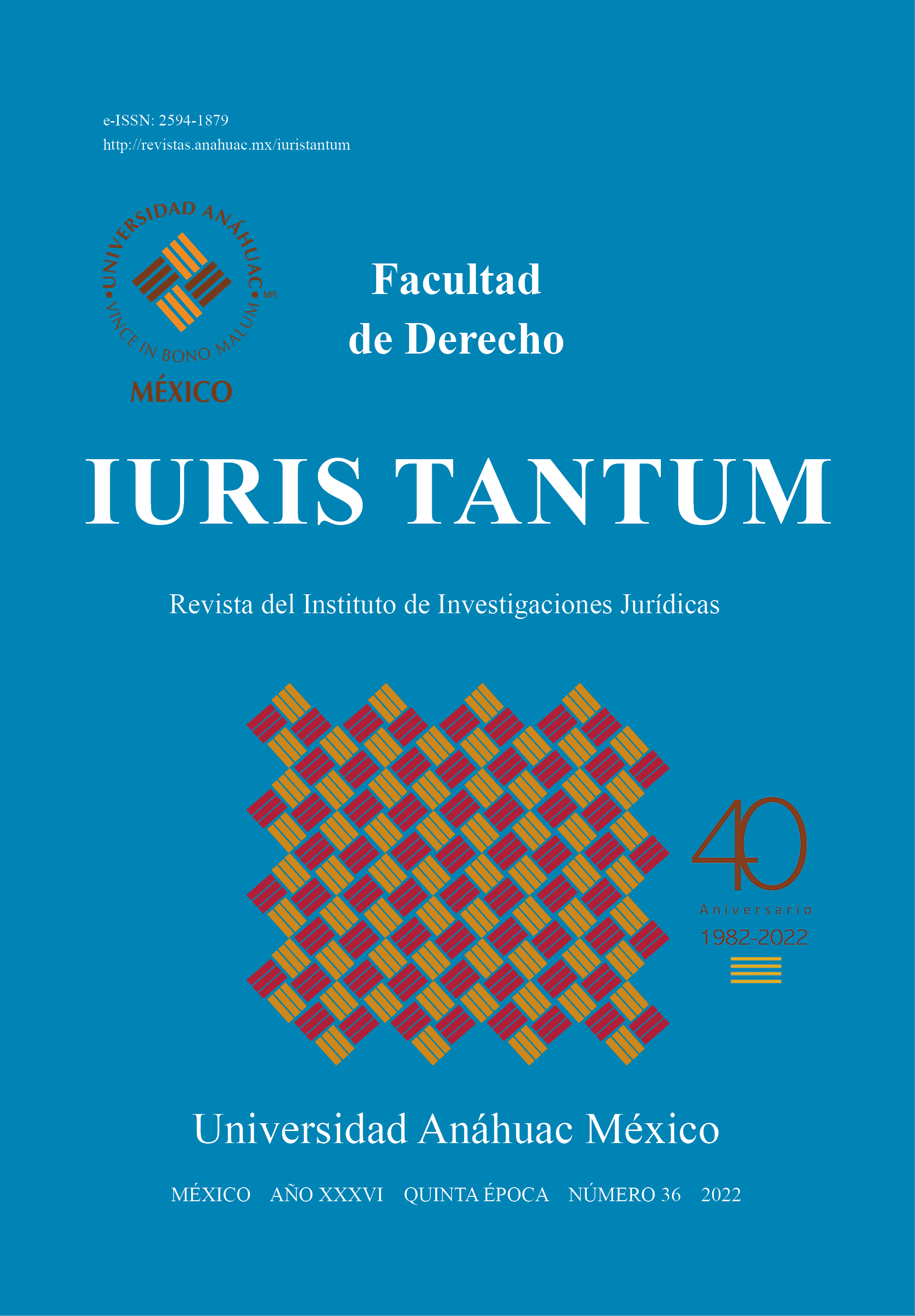The wicked problem of migration: narratives and designs of immigration policy in the United States 1990-2020
Main Article Content
Abstract
Based on a public policy analysis, this paper explores social narratives role in the construction of United States migration highly complex public problem (wicked problem). The way migration problem has been defined last three decades in that country has conditioned migration policy formulation processes, which has acquired sealing and securitizing characteristics of the Mexico-United States border. Narratives built about Hispanic migrants, criminalizing them and the embodiment of dangerous subjects, have conditioned government migration policies. At the same time, narratives have also been deliberately constructed for socially legitimizing a specific policy design.
Downloads
PLUMX Metrics
Article Details

This work is licensed under a Creative Commons Attribution-NonCommercial-ShareAlike 4.0 International License.
Iuris Tantum is distributed under international Creative Commons Attribution-NonCommercial-ShareAlike 4.0 International License.
The author keeps the property rights with no restriction whatsoever and guarantees the magazine the right to be the first publication of the work. The author is free to deposit the published version in any other medium, such as an institutional archive or on his own website.
References
AGUILAR, Luis F., Gobernanza y Gestión Pública, México, FCE, 2006, p. 500.
AGUILAR, Luis F., “Estudio introductorio”, Problemas públicos y agenda de gobierno, México, Miguel Ángel Porrúa, 2007, p. 286.
ALBA, Francisco, LEITE, Paula, “Políticas migratorias después del 11 de septiembre: los casos del TLCAN y la UE”, Migración y Desarrollo, Zacatecas, 2004, núm. 2, pp. 4-20. https://www.redalyc.org/pdf/660 /66000202.pdf
ALBA, Francisco, “La política migratoria mexicana después de IRCA”, Estudios demográficos y urbanos, México, vol. 14, núm. 1, 1999, pp. 11-37. https://doi.org/10.24201/edu.v14i1.1036
ÁNGELES, Hugo, “Las migraciones internacionales en la frontera sur de México”, Migraciones internacionales, Colección Los grandes problemas de México, tomo III, México, El Colegio de México, 2010, pp. 437-79.
ARMENDARES, Pedro, MORENO-BRID, Juan, ”La política migratoria de Trump: antecedentes y consecuencias para los migrantes mexicanos y sus comunidades”, México y la Cuenca del Pacífico, , vol. 8, núm. 22, 2019, pp. 9-3. https://doi.org/10.32870/mycp.v8i22.606
ARMENDARES, Pedro, La política migratoria de Trump. Impactos para los migrantes mexicanos y sus comunidades, México, Instituto Belisario Domínguez, México, 2018, p. 130.
BETTS, Alexander, Global Migration Governance, Londres, Oxford University Press, 2011.
BRUGUÉ, Quim et al., “Inteligencia administrativa para abordar “problemas malditos”, Gestión y Política Pública, vol. XXIV, núm. 1, 2015, pp. 85-130. https://www.scielo.org.mx/pdf/gpp/v24n1/v24n1a3.pdf
CEJUDO, Guillermo, “La nueva gestión pública. Una introducción al concepto y a la práctica”, Nueva gestión pública, México, Siglo XXI/BBADDF, 2013, p. 254.
CHRISTENSEN, Tom, “Post-NPM and changing public governance”, Meiji Journal of Political Science and Economics, vol. 1, 2012, pp. 1-11. http://mjpse.meiji.jp/articles/files/01-01/01-01.pdf
CLARKE, Michael, STEWART, John, Handling the Wicked Issues: A Challenge for Government, Birmingham, University of Birmingham, Institute of Local Government Studies, 1997.
COHEN, Antony P., Symbolic Construction of Community, Londres, Routledge, 1985, pp. 128.
DUNN, Timothy J., The Militarization of the U.S.-Mexico Border, 1978-1992, The Center for Mexican American Studies, University of Texas at Austin, 1996, p. 307.
ELDER, Charles, COBB, Roger, “Formación de la agenda. El caso de la política de los ancianos”, Problemas públicos y agenda de gobierno, México, Miguel Ángel Porrúa, 2007, pp. 77-104.
FERLIE, Ewan et. al, “Public Policy Networks and wicked problems: A nascent solution?”, Public Administration, vol. 89, núm. 2, 2011, pp. 307-324. https://onlinelibrary.wiley.com/doi/abs/10.1111/j.1467- 9299.2010.01896.x
GORE, Al, Creating a Government that Works Better and Costs Less. Report of the National Performance Review, Washington D.C., U.S. Government Printing Office, 1994, pp. 1-123.
HEAD, Brian, ALFORD, Jonh, Wicked problems: Implications for Public Policy and Management, Administration & Society, vol. 47, núm. 6, 2015, pp. 711-739. https://www.researchgate.net/publication/2755 73005_Wicked_Problems_Implications_for_Public_Policy
HERRERA-LASSO, Luis, México, el país de migración, México, Siglo XXI, 2009, p. 339.
KLAHN, Norma, “La frontera imaginada, inventada o de la geopolítica de la literatura a la nada”, Mitos en las relaciones México-Estados unidos, México, FCE/SRE, 1994, p. 528.
KOOIMAN, Jan, “Gobernar en Gobernanza”, en Cerrillo, Agustí (coord.), La Gobernanza hoy: 10 textos de referencia, Madrid, INAP, 2005, pp. 63-71.
NAIME, Mónica, “Defining wicked problems for public policy: The case of Mexico´s disappearances”, Revista Gestión y Análisis de Políticas Públicas, Madrid, INAP, núm. 23, mayo-octubre, 2020, pp. 64-80.
NELSON, Barbara, “La formación de una agenda”, en Aguilar, Luis F. (ed.), Problemas públicos y agenda de gobierno, 2ª. reimpresión, México, Miguel Ángel Porrúa, 2007, pp. 105-140.
OACDH (Oficina del Alto Comisionado para los Derechos Humanos), Migración, derechos humanos y gobernanza, Nueva York, ONU/OIT, Manual para parlamentarios No. 24, 2015.
Organización Internacional para las Migraciones (OIM), World Migration Report 2022, s.l.i., 2021, p. 540, https://publications.iom.int/books/world-migration-report-2022
PARSONS, Wayne, Políticas Públicas. Una introducción a la teoría y la práctica del análisis de políticas públicas, traducción Atenea Acevedo, Argentina, FLACSO México, Miño y Dávila Editores, 2007, p. 816.
Pew Research Center (PEW), Hispanic Population and Origin in Select U.S. Metropolitan Areas, 2014. https://www.pewresearch.org/hispanic/interactives/hispanic-population-in-select-u-s-metropolitan-areas/
POLLIT, Christopher, “Is the Emperor in his Underwear? An Analysis of the Impacts of Public Management Reform”, Public Management and International Journal of Research and Theory, vol. 2, núm. 2, 2000, pp. 181-200.
POLLIT, Christopher, Bouckaert, Geert, Public Management Reform. A Comparative Analysis, Oxford, Oxford University Press, 2000, p. 314.
RITTER, Horst, WEBBER Melvin, “Dilemmas in General Theory of Planning”, Policy Sciences, vol. 4, núm. 2, 1973, pp. 155-169.
ROTH, André-Noël, Políticas Públicas. Formulación, implementación y evaluación, Bogotá, Ediciones Aurora, 2014, p. 292.
SANTA ANA, Otto, Brown Tide Rising: metaphors of latinos in contemporary American public discourse, Austin, University of Texas Press, 2002, p. 424.
SUBIRATS, Joan et al., Análisis y gestión de políticas públicas, Madrid, Ariel, 2008, p. 285.
United States Census Bureau, Decennial Census of Population and Housing, 2020. https://www.census.gov/programs-surveys/decennial- census.html
VELÁZQUEZ, Mario, ”La construcción de la imagen de México en Estados Unidos desde una perspectiva de riesgo”, Frontera Norte, vol. 20, núm. 39, 2008, pp. 37-67. https://doi.org/10.17428/rfn.v20i39.995

